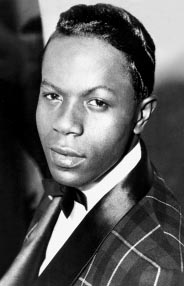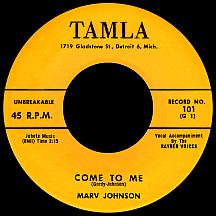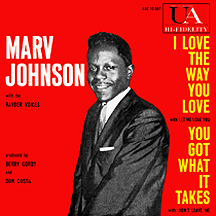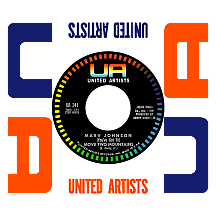MARV JOHNSON
The history of Motown Records revolves around one man: Berry Gordy. While a few others shared his vision, it was Gordy alone who took control of his own fate and ultimately made things happen. After a failed venture between 1953 and 1955 as the owner of the 3 Dimension Record Mart on Farnsworth in Detroit, he set his sights on making it as a songwriter. He worked with Brunswick Records artist Jackie Wilson from '57 to '59, composing several of his early hits with collaborator Roquel "Billy" Davis. Others close to him had related interests; competition even came from within the family. Older sister Anna Gordy, who'd worked as a distributor for Chess and other labels, released the first single on her Anna label within days of Berry's entry into independent label ownership.
"What was the first Motown record?" is an often-asked question whose reasonable answer by consensus is "Come to Me" by Marv Johnson, pressed in January 1959 on Tamla (catalog number 101), the first of the many labels owned by Berry Gordy that constitute what later became famously known as Motown. Marv and his song were the company's very first artist and hit, yet budgetary restrictions resulted in Gordy defaulting the lion's share of profits to United Artists Records, a much larger independent label (with a movie studio to cover the financial end); Gordy built his business model on the things he learned during the experience of writing and producing Johnson's records for UA.
For Marv, it was the realization of a dream. While growing up in Detroit, he'd been fascinated with the gospel music he heard regularly in church; his favorite popular performer was the wildly entertaining bandleader and hitmaker Louis Jordan. For a time, he lived in Crenshaw, Mississippi with an uncle who introduced him to the blues; upon returning to Detroit, his high school years were filled with the R&B hitmakers of the day (The Clovers, Ruth Brown, Ray Charles) while he studied piano and sang with a group, The Junior Serenaders. For several months, the group performed for a "tent show" carnival that made its way through many small southern and midwest cities. He was working at the Prince and Adams Record Shop on 12th and Hazelwood Streets in Detroit when Sonny Woods (a former member of Hank Ballard's Midnighters) set him up to do a recording session on two of his songs for the small Kudo label; the lively "My Baby-O" was backed with a doo wop-style ballad, "Once Upon a Time," both with musical support from Harold "Beans" Bowles and his band.
Around that time, Gordy was considering cutting ties with Wilson over a royalty dispute with shady Brunswick president Nat Tarnopol. Marv, with one failed single release on his resumé, was still working at the record shop when Berry and his wife Raynoma showed up. Marv auditioned for them in the back room, playing piano and singing his original song "Come to Me." His style, greatly inspired by singers like Wilson, Clyde McPhatter and Sam Cooke, was raw but impressive. Gordy's finances were tight; he managed to borrow 800 dollars from his family, not an easy undertaking, one that came with a legal contract that required him to hand over all the proceeds until the debt was paid in full, including interest. Once the deal was made, he set up a session at United Sound Studio, located at 2nd and Antoinette Streets; the upbeat song (and its B side ballad, "Whisper") featured backing vocals by The Rayber Singers (a trio made up of Raynoma, Brian Holland and bass singer Robert Bateman) and a flute solo by Beans Bowles, who'd done the same on some of Wilson's hits.
Berry, fed up with being at the mercy of the large label executives, decided these songs would be the ones to launch his Tamla label (he'd gotten the idea for the name from Debbie Reynolds' number one hit, "Tammy," but it had already been registered, so he changed it to Tamla). An apartment on Gladstone Street that he shared with Raynoma served as his office. Pressings of the 45 were made at a plant in Owosso, about 90 miles to the north. Immediately, the record received airplay on two Detroit-area R&B-formatted stations, WJLB and WCHB. Though confident it was a hit, Gordy was again out of money, which forced him to work out a deal to have the single distributed nationally. United Artists Records had been established primarily to release albums of the soundtracks from UA films. In the singles market, the label's earliest hits came from the R&B sector, beginning with "Try the Impossible" by Lee Andrews and the Hearts in the summer of '58. Johnson's record (on Tamla in Michigan and UA everywhere else, according to the terms that were negotiated) took off in early '59; Marv was signed to the label with Gordy as his manager, supplying him with songs he'd written with Davis (who used the name Tyran Carlo) in addition to producing the sessions (a privilege he hadn't been granted with Jackie Wilson).
In April, "Come to Me" spent three weeks in the rhythm and blues top ten while reaching the mainstream top 30. Gordy used this momentum to get another of his discoveries, Eddie Holland, signed to United Artists shortly afterwards; "Merry-Go-Round" followed the same pattern (Tamla in Michigan, UA in the rest of the country), though it didn't catch on. Marv's second single, "I'm Coming Home," a near-soundalike to the first disc, squeaked its way to a lower chart berth. Holland was dropped by UA a year later after three failed discs. Marv might have suffered the same fate if his third release had stiffed...but it happened to be the great hit of his lifetime. The lyrics of "You Got What it Takes" turned a negative sentiment positive in the first four lines: 'You don't drive a big, fine car...you don't look like a movie star...and on your money we won't get far...but baby, you got what it takes!' Originally recorded with a blues arrangement by guitarist-singer Bobby Parker, the song had been issued by Vee-Jay Records in the spring of '58 (a black mark in Motown history: Gordy claimed writer credit and Parker never received compensation).
After an appearance on Dick Clark's American Bandstand in late October, Marv's single began its climb on the Billboard charts, peaking in the top 40 quickly before taking a big downward move in mid-December. Then it reversed direction, continued on a bumpy road and finally made the top ten in February, notching a four month run in the top 40, longer than most singles in those days. On the R&B charts its journey took him as high as number two (then a completely different song with a similar title, "Baby (You've Got What it Takes)" by Brook Benton and Dinah Washington, leapfrogged Marv into the top spot). Johnson had become a star, with top-billed bookings at clubs like Harlem's Apollo and the Howard Theater in Washington, D.C. Gordy suddenly had more than enough money to pay off the debt to his family and begin releasing records on Tamla through his own distribution channels; by this time he'd purchased the house on Grand Boulevard that became famous as "Hitsville U.S.A."
"I Love the Way You Love" (penned by Gordy and "Mikaljon," a portmanteau for Raynoma's brother Mike Singleton, Al Abrams and John O'Den) equaled its predecessor that spring with a top ten chart placement and a second consecutive number two R&B hit. The next single, "Ain't Gonna Be That Way" backed with "All the Love I've Got," found both tracks recieving airplay, a split between radio DJs that kept either side from making the top 40. The next release, Gordy's solo-penned "(You've Got To) Move Two Mountains" (containing lyrical demands of superhuman feats in order to win back his ex's love) returned the singer to the top 20 in October.
Though Johnson was on a larger label, his success had a direct influence on the rise of the independent Tamla and Motown labels; Gordy put most of the UA money he earned back into his own company's artist development and production. "Happy Days," composed by Gordy with one-time-hitmaking housewife Toni McKnight, was a top ten R&B hit in January 1961. Marv and Detroit native Aretha Franklin (a newly-signed Columbia Records artist) had begun dating, but the relationship didn't last long; some have speculated their individual careers had taken preference over any ideas of getting married and having a family. Aretha married another guy (Ted White) later in the year while Marv stayed the course of his career.

Despite UA's operation being in New York, Johnson recorded most of his songs in Detroit with the regular gang. When his contract came up for renewal in 1961, Gordy asked if he wanted to leave them and join Motown, but Marv chose to stay with UA, preferring the "sure thing" a larger label, with its staff of seasoned professionals, could offer. His early '61 single "Merry-Go-Round" (a remake of the song about a "love rectangle" that Eddie Holland had recorded for UA) turned out to be his last charting record for them. At that point in time he was the only act in Gordy's growing stable who'd had even one top ten hit (much less two), but that was about to change as The Miracles, The Marvelettes and many others would soon be major stars, plying their trade right there at the house on Grand in D-Town; Marv could have been right in the thick of it but had opted out.
Production and songwriting duties for Johnson had been handed off to Motown staffers William "Mickey" Stevenson, Clarence Paul and others. Marv appeared in the summer '61 film Teenage Millionaire starring singer Jimmy Clanton and middleweight boxer Rocky Graziano, an unusual black and white production with color segments featuring performances by Dion, Chubby Checker, Jackie Wilson, Clanton and others; Marv's contributions were "Oh Mary" and "Show Me." He held onto his Detroit connection, appearing on the bill of the fall 1962 Motortown Revue, even though by that time he worked strictly out of the New York studio, recording songs penned by some of the city's hottest writers (Burt Bacharach and Hal David, Ellie Greenwich, Bert Berns), yet to no avail; over a 30-month span, ten straight releases were flops. United Artists declined to pick up his option in early 1964.
He returned to Motown but there were only three singles, all on the Gordy label, released in as many years. "I Miss You Baby (How I Miss You)," produced by Stevenson, Paul and Ivy Jo Hunter, reached the top 40 of the R&B charts in the summer of 1966, a welcome return to the national listings, if only for that one instance. "You Got What it Takes" was big all over again by way of a new version by The Dave Clark Five that landed in the U.S. top ten in May 1967. Marv's final release for Motown, "I'll Pick a Rose for My Rose," made a surprise appearance in the top ten of the British charts in 1969, his only top ten there besides "You Got What it Takes" nine years earlier. By that time, Marv had quit making records. He worked in Motown's promotion department for a few years while writing songs on the side; "Give Your Baby a Standing Ovation," which he composed with Henry Williams, was a hit in 1973 for Chicago-based quartet The Dells.
After spending about a decade away from the music business, he began appearing on packaged oldies shows in the 1980s, during which time he toured with other former Motown stars including Mary Wells and Martha and the Vandellas. In 1987, The Velvelettes cut a record for the U.K.'s Nightmare Records, run by Motown fan Ian Levine; Wells and Kim Weston followed suit and so did Marv, with two dance club offerings, "By Hook or by Crook" and "Run Like a Rabbit" in '88 and '89. A sudden stroke ended his life just a few years later, in 1993 at age 54.
So how does Marv Johnson ultimately fit into the Motown story? Beyond "Come to Me," his right-time, right-place breakthrough often cited as the "first" Motown hit, he mostly stood on the sidelines of the action that was going down in the house/studio known as Hitsville U.S.A. Popularity had come during a different time, 1959 through 1961, before Motown really took off, but his contribution is an important one. Who's to say whether Motown would have become the historic entity it is today, and will always be, if those Berry Gordy-produced United Artists hits had never been made?
NOTABLE SINGLES:
- My Baby-O /
Once Upon a Time - 1958 - Come to Me - 1959
- I'm Coming Home - 1959
- You Got What it Takes - 1960
- I Love the Way You Love - 1960
- Ain't Gonna Be That Way /
All the Love I've Gor - 1960 - (You've Got To) Move Two Mountains - 1960
- Happy Days - 1960
- Merry-Go-Round - 1961
- I've Got a Notion - 1961
- Oh Mary - 1961
- Johnny One Stop - 1961
- He Gave Me You - 1962
- Unbreakable Love - 1964
- Why Do You Want to Let Me Go - 1965
- I Miss You Baby (How I Miss You) - 1966
- I'll Pick a Rose for My Rose - 1968
- By Hook or by Crook - 1988
- Run Like a Rabbit - 1989




